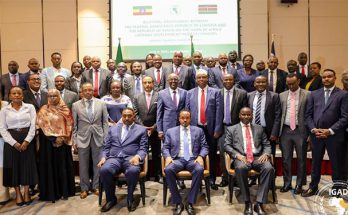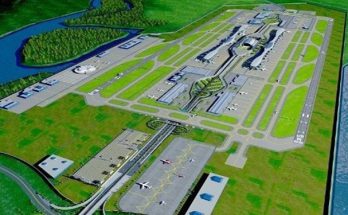 Ethiopia’s trade and investment relation with Gulf countries/Bahrain, Kuwait, Oman, Qatar, Saudi Arabia and the United Arab Emirates/ has though shown progress since recent years, there is a huge imbalance compared with country’s untapped economic opportunities and latter’s enormous capital.
Ethiopia’s trade and investment relation with Gulf countries/Bahrain, Kuwait, Oman, Qatar, Saudi Arabia and the United Arab Emirates/ has though shown progress since recent years, there is a huge imbalance compared with country’s untapped economic opportunities and latter’s enormous capital.
Most of the Gulf countries have plentiful petroleum resources that have enabled them to be among world economic powers with immense potential for Foreign Direct Investment (FDI).
The price fluctuation of oil in global market has, however, posed a challenge and reduced energy exporting nations’ revenue from the sector. As a result, there is a growing demand among Gulf countries to lower their dependence on oil revenue and diversify their economies.
On the other hand, Ethiopia has offered wide investment opportunities for Gulf countries in the areas of agriculture, energy, health care, tourism and hospitality sectors which are crucial for the latter to achieve their goals of economic diversification.
In an exclusive interview with The Ethiopian Herald, Ministry of Foreign Affairs Middle East Affairs Director- General Ambassador Suleiman Dedefo says the previous government’s failure to adopt investment friendly polices coupled with the Arabs’ limited investment mentality had limited the active economic ties of the two.
Ambassador Suleiman further notes that the historical mystification of denying Ethiopia’s membership in the Middle East community and repudiating the fact that its peoples share similar cultural and religious identities with the Arabs were also hampered the two sides from making a meaningful economic engagement.
He says: “Some individuals held wrong perception towards Ethiopia and trying to portray the country as the enemy of Arabs working to block Islamization and Arabization in East Africa. In fact, our previous leaders had a tendency of accepting this mystification.”
An important milestone in boosting economic ties was Ethiopia’s adoption of Foreign Affairs and National Security Policy and Strategy that attaches due emphasis to mutual economic benefits. In this regard, relation with the Gulf countries is deeply focused to attract FDI and to make them destinations for agricultural exports, Ambassador Suleiman notes.
The Foreign Policy redefined poverty, not countries, as a threat for country’s survival and gave emphasis for peaceful co-existence. In this regard, the Policy has registered remarkable success in correcting the wrong preconceptions and built the trust of Arab leaders giving guarantees for their investors to do business in Ethiopia.
Ambassador Suleiman says the signing of Agreement for Promotion and Protection of Investment and Avoidance of Double Taxation with some Gulf countries would also play pivotal role to attract more investment from the region to Ethiopia.
In its endeavor to make Ethiopia attractive to FDI globally, the government has also been hugely investing to improve infrastructural networks and set policies that create favorable investment climate. The efforts have borne fruits by attracting large-scale Gulf companies including Sheikh Mohammed Hussein Ali Al Amoudi’s multi-sector corporate MIDROC and UAE-based companies like Julphar Gulf Pharmaceutical Industry and Al Ghurair Group’s Aluminum Factory.
Information obtained from the Ethiopian Investment Commission indicated that during the past six years, Saudi Arabia and UAE have been the leading investing countries from the region spending seven billion Birr and 360 million Birr respectively.
While Saudi Arabia remains the 4th largest foreign investor in Ethiopia, Derba MIDROC Cement Factory and Saudi Star Agricultural Development Plc. are among its flagship projects. Julphar Pharmaceuticals and Maaza Mango Bottling plants which both set up in joint venture with local firms, are among UAE investment.
The Director-General states that Gulf investors have shown a growing desire to involve in Ethiopia’s agriculture sector and re-export produces to their own markets so as to support their countries goal of ensuring food self-sufficiency through overseas investment.
Accordingly, Gulf leaders set various platforms including King Abdullah’s Initiative for Saudi Agricultural Investment Abroad and Abu Dhabi Fund for Development to encourage investors engaged in the sector while eyeing Africa as a primary destination.
Suleiman says: “Currently many Gulf investors came to Ethiopia to conduct feasibility studies in the agriculture, hospitality, energy and pharmaceutical industries and some of them obtained investment licenses. In addition, some business persons got plots to build star designated hotels and we expect greater inflow among Gulf investors in few years to come.’
Concerning trade, Gulf countries have been among Ethiopia’s main destinations for its agricultural exports such as live animals, meat, cereals, fruits, vegetables and flowers among others.
The Director General says Ethiopian missions in the Gulf have played a leading role in fostering economic partnership through promoting country’s investment opportunities, seeking markets for its agricultural exports and linking the two sides business people.
Ministry of Trade discloses that Ethiopia obtained 326.5 million USD from exporting agricultural commodities to the Gulf in 2016/17 fiscal year. Saudi Arabia and UAE are the largest export destinations to Ethiopia importing 196.5 million USD and 120.7 million USD worth produces respectively.
“Starting from nearly non-existent economic platform, the current government has changed the intangible suspicion with Gulf countries to the tangible trade and investment relations,” Ambassador Suleiman stresses.
The economic expert, Zemedeneh Negatu, agrees on Suleiman’s idea. He says among other things, the decision Dubai Chamber of Commerce and Industry /DCCI/ made to open its first International Branch Office in Addis Ababa showcased the development.
Zemedeneh notes that a few months back Ezdan Holding Group, one of the biggest companies in Qatar, came to Ethiopia to invest in the real estate business and its representatives conducted discussions with high level public officials.
Yet, this is insignificant when compared with Ethiopia’s untapped investment opportunities and the desire Gulf countries have shown for investing in the former.
Zemedeneh stresses that identifying region’s objective reality is so crucial to benefit more from the economic engagement. In this regard, he advises the government and other stakeholders to give attention for agricultural sector so as to take the advantage of Gulf countries’ reliance in food importation.
He says: “Supporting by high soil fertility, the amenability of its climate towards the cultivation of diverse range of crops and the comparative abundance of water, Ethiopia could be one of the major sources of food for the Gulf countries.”
Economic analyst at the Embassy of the United Arab Emirates to Ethiopia, Dr. Fikru Deksisa agrees with Zemedeneh. He states agriculture should be the primary target for Ethiopia in doing business with the Gulf where farming is more difficult and expensive due to harsh climate and low water supply.
Dr. Fikru notes that keeping quality standards has an indispensable role to narrow the gap between Ethiopia’s potential for agricultural export and its actual performance in the Gulf food market. He further states exporting quality items would also enable Ethiopia to take over the dominant share countries far away from the region have enjoyed in Gulf’s agricultural market.
He says: “Export quality gaps hinder Ethiopia’s competitiveness in the Gulf food markets and if we able to supply commodities with the desired quality level and appealing packages, they have no reason to go far away to buy agricultural products.”
Zemedeneh on his part advises stakes to do more investment promotion activities that would boost the business community’s awareness and to lure additional investment from the private sector and the state owned companies of the Gulf.
The economic expert says Ethiopian missions are expected to partnering with relevant bodies of the respective countries to aware Gulf investors to deploying their huge capital in Ethiopia’s manufacturing, energy, hospitality and other key sectors and benefit more.
Dr. Fikru agrees with Zemedeneh, he states Ethiopian embassies and consulate generals in the region need to extending trade missions that would have a role to aware Gulf investors country’s untapped investment opportunities. The trade missions would also pivotal to Ethiopia find new markets for its exports and initiate business people to invest in the respective countries.
Signing investment protection and promotion agreements, promoting country’s investment opportunities and improving agricultural exports quality are measures the government should strengthen to create the much desired synergy between Ethiopia’s economic opportunities and the Gulf’s huge capital, the experts underscore.



